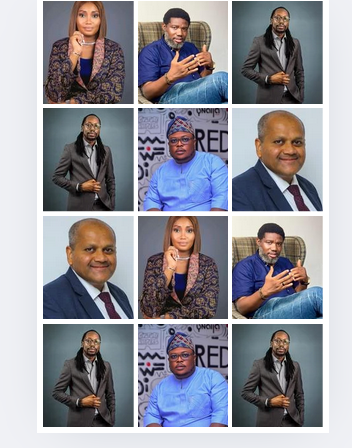By Felicia Nwosu
Nigeria’s media and advertising sectors are navigating a rapidly evolving landscape, grappling with digital disruption and economic pressures. Industry leaders recently shared their perspectives on these challenges and the strategies they are employing to adapt and thrive. These top CEOs shared these perspectives in separate interviews with MARKETING EDGE ONTV recently in Lagos.
Victoria Abiola-Ajayi, Group Managing Director and CEO of TVC Communications, emphasised the fragmentation of the media market, noting the proliferation of radio and television stations alongside the surge in digital platforms.
She described Nigeria as “one of Africa’s most fragmented media markets,” with competition fierce across terrestrial TV and radio (both government-owned and private), cable and satellite (DSTV, Start Times, Go TV) facing competition from digital streaming, and online news and blogs vying for attention. She pointed out that social media and influencers further intensify this competition, with everyone battling for younger audiences.
The Fellow of ACCA and a member of its Global Governing Council stated that this fragmentation results in audiences having more choices, but it also means that advertising budgets are scattered, forcing advertisers to decide between social media and traditional broadcasters. She stressed that survival in this environment “really depends on how you can differentiate your unique content and your niche focus and your unique offering,” and that businesses need to provide services and content that their audience needs and wants.
Taiwo Ogunwumi, CEO of Brooks and Blake, discussed the evolution of the Public Relations (PR) sector, highlighting its expansion beyond traditional media relations into strategic communication and reputation management, driven by advancements in digital media and artificial intelligence.
The image-building consultant observed the significant growth of the PR industry and the shift in perspective towards strategic management, emphasizing that the practice has evolved beyond simply placing stories in the media. He noted that factors like digital media, social media, and AI have created a “plethora of opportunities” within the PR practice.
Looking ahead, he anticipates a future with “a good relationship between machine learning and what humans do,” along with the need for vigilance in managing communication. The PR expert also expects a review of industry standards and practices due to growing expectations and engagements with brands, both locally and internationally. Ogunwumi identified a key challenge in ensuring that only qualified professionals practice strategic communication and reputation management. He stressed the importance of moderation in communication and engagement, given that “everyone has a voice” due to digital and social media.
Ogunwumi emphasized the need for PR professionals to stay ahead of the curve, be strategic, and effectively guide their partners and clients. He also highlighted the role of PR in educating the public about different perspectives on brands and companies, while adhering to legal practices and staying in step with how the public consumes and shares information. The passionate PR professional discussed the shift from one-way communication to a two-way flow, with brands responding to consumer queries and concerns. He suggested that brands should proactively engage and educate consumers with quality communication, rather than just reacting to issues, and that the future of PR will involve more collaboration between brands and their audiences.
Israel Obatunde, CEO of Ideas Origin Media, addressed the economic difficulties facing advertising agencies, including the challenges posed by inflation and talent retention. Obatunde stressed the need for agencies to focus on efficiency and client retention while navigating these pressures.
Despite the economic challenges, he remains optimistic about the potential of programmatic advertising, emphasizing its importance in driving measurable results. He also stressed the importance of adaptability in the face of fluctuating market conditions, advising agencies to “think outside the box,” take risks, and pivot quickly to seize new opportunities.
The creative wizard acknowledged the swift changes within the advertising industry, emphasizing the need for agencies to be more than proactive and agile in anticipating client needs, and noted the mental demands on professionals due to the fast-paced nature of the industry. He also discussed the challenges posed by inflation, which affects businesses like advertising by increasing the cost of labor, suppliers, and vendors.
He pointed out the difficulty in balancing the high cost of creativity with client demands, and stressed the need for strategic decision-making to cut costs effectively, increase cash inflow, and retain talent. He emphasized that mitigating inflation requires understanding the team, transparency, communication, and a focus on bringing in more money and new clients.
Obatunde highlighted the value of programmatic advertising in helping businesses predict, track, and evaluate results, and stressed the importance of using available tools effectively. He noted that professionals need to “double up on a lot of things at the same time” to deal with the demands of the current advertising landscape.
Patrick Gomes, CEO of DigitXplus, discussed the opportunities presented by digital media, highlighting the growing importance of AI and creative content in driving performance. The digital marketer emphasized the trustworthiness of digital advertising, stating that it “allows an opportunity for clients to possibly invest with needed confidence,” particularly due to the ability to reach consumers through mobile devices.
He pointed out that over time, digital advertising has proven its value to clients through metrics like Return on Ad Spend (ROAS) and Return on Investment (ROI). He highlighted the importance of creativity in delivering performance, stating that there is “no end to it.” He discussed the need to balance creativity with performance, ensuring that increased exposure translates to increased value.
The digitXplus leader also emphasised the role of AI in driving efficiency and effectiveness across various aspects of advertising, including paid media management, creativity, and content. He explained how AI can automate tasks, improve research, and process large amounts of data to provide valuable insights. The digital business thought leader also discussed the impact of new platforms like TikTok on the digital advertising market. He believes that TikTok’s entry will create new opportunities for advertisers and increase the overall size of the market, rather than simply diverting spending from other platforms like Meta or X.
Ayodeji Razaq, CEO of Red Media Africa, provided insights into the Public Relations (PR) industry in Nigeria, noting that while the market is currently valued at $150 million, experts suggest it may be shrinking. Razaq attributed this to the evolving nature of storytelling and communication in the digital age.
He emphasised the crucial role of technology in this shift, highlighting how social media has empowered individuals to shape narratives. The PR professional stressed the need for agencies and organizations to adapt by creating new storytelling methods and effectively managing these stories across social media platforms. He identified a key challenge as the democratisation of storytelling, where “everyone with a phone can tell a story,” which has lowered the barrier to entry for image-making and brand communication.
The PR advocate observed that brands are adopting a more humanized approach to communication to connect with younger audiences, who now constitute a significant portion of the Nigerian population. This shift requires brands to create new ways of reaching and engaging these audiences, who are more independent in their consumption choices.
He also discussed the trend of poaching professionals within the industry, which he sees as a global problem stemming from the fact that “everyone is a marketer” and “everyone is a content creator.” This has led to a talent battle among agencies, resulting in a skills gap and the need for increased training and support within the industry. He acknowledged the impact of this on the industry, including the need for more training and support from stakeholders.
The views shared by these industry leaders highlight the multifaceted nature of Nigeria’s media and advertising sectors. While there are common themes of adaptation to digital change and economic challenges, each CEO provided a unique assessment of their respective areas, shedding light on the complexities and opportunities within the industry. The perspectives underscore the necessity for adaptability, innovation, and creativity in shaping the future of Nigeria’s media and advertising market. As technology continues to evolve, the ability to integrate digital advancements, measure effectiveness, and attract skilled talent will be essential for businesses to thrive in this dynamic and increasingly competitive landscape






Comment
No comments found.